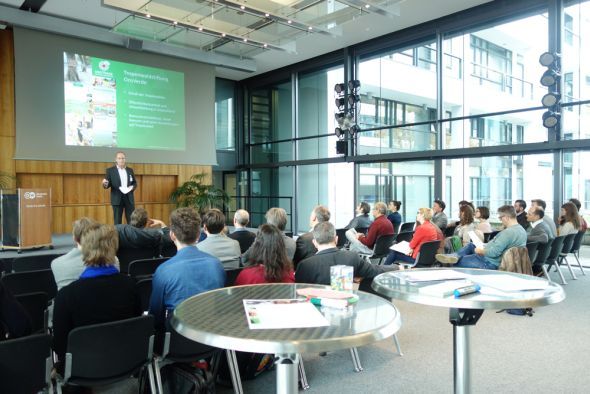Forest Values – Strong partners for valuable forests

As part of the opening event of the project ForestValues, participants discussed financing models designed to achieve a win-win-win situation.
Around 40 experts met in Bonn at the beginning of November 2016 for a conference called ‘Forest Values – Strong partners for valuable forests’ on the topic of tropical forest and business. They found out about existing financing models for long-term, socially responsible forest protection and shared their experience and ideas about corporate partnerships, funds, crowdfunding, cooperatives and shareholdings. The event was held by OroVerde – Tropical Forest Foundation as part of the project ‘Development of business models for cooperation with the private sector as a tool for socially acceptable restoration of near-natural forests’ run by the International Climate Initiative (IKI) of the German Environment Ministry (BMUB).
The IKI project promotes a socially responsible restoration of near-natural forests in Guatemala and cooperates with the private sector to develop corporate social responsibility (CSR) business models to achieve long-term funding for the protection and restoration of forests.

The aim of the event was to develop potential financing models to market products from the project areas in Guatemala, such as cocoa and breadnut (ramón), and to initiate a committee to support and advise the project. Participants from the banking sector (GLS Bank), the consulting industry (OpenForests, Forest Finest, Bauminvest, Global Exchange for Social Investment – GEXSI), nature conservation organisations (such as Global Nature Fund, WWF and Friends of the Earth Germany) and politicians discussed new ecological farming methods and value chains that help protect forests and preserve diversity as well as providing sustainable sources of income. There was a lively debate on the pros and cons of particular financing models:
It was noted that while setting up a cooperative provided scope for co-determination, it also posed the risk of becoming a ‘land grabber’ if it was financed through lease fees. Moreover, participants observed that the risk of total loss must not be underestimated. The Impact First Fund model was presented as a way of financing several projects, products or regions, but as one that required a considerable amount of capital to set up (around 1 million euros). In the case of financial participation, an investor and a local farmer set up a joint firm covering the value chain. The sales proceeds are divided up into a share for the farmer and the investor’s return on investment. Crowdfunding can be used to raise different funding amounts, but involves a great deal of work and intensive supervision. Purchase guarantees mean that an entrepreneur buys the products directly and is given influence over the production process. Participants saw the high degree of dependence of the farmers on the entrepreneurs in a critical light.
The results of the event will be fed into actual project work and used in both national and international political networks.

The link has been copied to the clipboard
Contact
IKI Office
Zukunft – Umwelt – Gesellschaft (ZUG) gGmbH
Stresemannstraße 69-71
10963 Berlin






![[Translate to English:]](/fileadmin/_processed_/0/1/csm_20230712_AdobeStock_604924276_Baum_Hand_0d56a1fbb6.jpeg)





